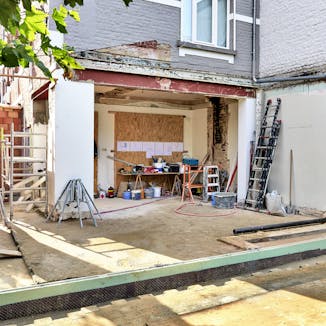See the latest £70,000 loan rates, get a quote and check your eligibility without impacting your credit score.
Get a decision within an hour
Quote won’t affect your credit score
Poor credit & arrears accepted







These products are only available via a broker and can't be applied for directly
We're on a mission to improve the finances of the nation by helping you to spend wisely and save money



We're on a mission to improve the finances of the nation by helping you to spend wisely and save money



By Matt Fernell, Editor-in-Chief at Finance.co.uk.

Borrowing £70,000 to renovate your home or clear debts is a big commitment, so getting the best deal is essential. Here’s what you need to know to find a £70k loan that works for you.
We work with Loans Warehouse to make sure you find the right loan. We’ll compare the latest rates from the UK’s leading lenders to help you get the lowest rate.
Get a decision within an hour
Check your eligibility with no impact on your credit score
Poor credit history accepted
Quotes tailored to you
To find quotes for £70,000 loans tailored to you, we just need to know about:
The loan term you’re looking for
Your finances
Your personal details
We’ll then get back to you with a decision within an hour and show you personalised quotes based on your circumstances.
£70,000 loans are only available as secured loans, which means you’ll need to be a homeowner to get one. Here's how secured loans work.
To be eligible for any loan, you will also need to be:
A UK resident
At least 18 years old
Able to prove you have a steady income and can afford the repayments
When you get quotes with us, we’ll perform a ‘soft check’ on your credit record, so we’ll only ever show you rates you are eligible for.
It is possible to get a £70,000 home loan if you have a poor credit history, and secured loans are usually easier to get than personal loans when you have bad credit.
Lenders are usually more willing to offer secured loans because using your home as collateral reduces their risk. This means if you default on the loan they can use the equity in your property to cover any losses.
However, your loan will be more expensive if you have a poor credit score because lenders will offer you a higher interest rate. Find out more about getting a loan with bad credit here.
A debt consolidation loan could be the answer if you have a low credit score and need help managing your borrowing. This is a loan that can pay off your expensive debts and consolidate them into one affordable repayment.
To understand how much the repayments on a £70k loan will cost, you need to know the interest rate (APR) and the term of the loan.
For example, if you had a £70,000 loan over 5 years with an APR of 9%, you would need to repay:
£1,441.18 each month
£86,470.93 in total over the lifetime of the loan
In this example, the cost of the loan in interest over the 5-year term would be £16,470.93.
If you want to pay less each month, you can extend the term of the loan; however, this will mean paying more in interest overall.
For example, the same £70,000 loan over 10 years would have monthly repayments of only £873.48, but the total repayable amount would be £104,817.60. That means the overall cost in interest would be £34,817.60 - more than double the cost of borrowing over 5 years.
If you cannot make your loan repayments, the first thing to do is contact your lender and explain your situation to them.
They should be able to help you manage your loan by revising your repayment plan or allowing you to take a repayment holiday to help you get your finances back on track.
You will face late payment fees and interest if you miss repayments without speaking to your lender. Defaulting on your loan will also harm your credit rating and could even put your home at risk.
The information provided does not constitute financial advice, it’s always important to do your own research to ensure a financial product is right for your circumstances. If you’re unsure you should contact an independent financial advisor.
APR is short for Annual Percentage Rate. It's a calculation of the overall cost of your loan and takes into account all the costs during the term of the loan, including set up charges and the interest rate. Any extra fees are added to the loan amount before interest is calculated.
Depending on the lender, you could take out a £70,000 secured loan over a term of between one year and 30 years.
To find the right term for your £70k loan, consider how much you can afford to pay towards your monthly repayments.
The shorter the term, the less interest you will pay overall. That’s why you should try to work out the maximum you can afford to repay each month to get the shortest term possible.
The application process for a secured £70k loan can take a few weeks because you’ll need to provide extra documents like proof of home ownership and your latest mortgage statements.
The lender may also want to carry out a survey and valuation of the property before they agree to lend you the money. However, once your loan has been approved, you can get the money on the same day.
When you receive your £70k loan, you can use the money however you like. Common ways people use a secured loan include:
Paying for home improvements
Consolidating expensive debts
Buying an expensive item like a new car
Covering the cost of an expensive event like a wedding
However, many lenders do have restrictions on things they won’t offer loans for, including:
High-risk investments
Gambling
Buying property or land
Holiday timeshares
Before finding quotes, we ask what you want the money for, but this is predominately just to help you get the right deal.
Borrowing £70k is a big commitment, so only apply if you are sure you need the money.
When applying for £70,000 secured loan, you can choose a fixed or variable interest rate deal.
With a fixed interest rate, your monthly repayments will remain the same for the whole term of the loan, and what you owe won’t change. This can make budgeting easier and will protect you from rising interest rates.
A variable interest rate, however, can change in response to things like the Bank of England base rate. This means your monthly repayments can go up or down, so it’s harder to budget, but you could benefit from falling interest rates.
Which option is best for you depends on your attitude to risk and what level of flexibility you want with your repayments.
Most personal loans are only available up to £25,000, so it’s very unlikely you will be able to find an unsecured loan for £70,000.
Personal loans are more risky to lenders because they don’t have any security if you’re unable to make your repayments. This is why most loan providers don’t offer unsecured loans for large amounts.
Some specialist lenders may be willing to offer a £70k loan on an unsecured basis, but you’ll need to have an excellent credit record and strong income.
It’s worth remembering that unsecured loans normally come with a higher interest rate than secured loans, so you’ll pay more in interest over the term of the loan.